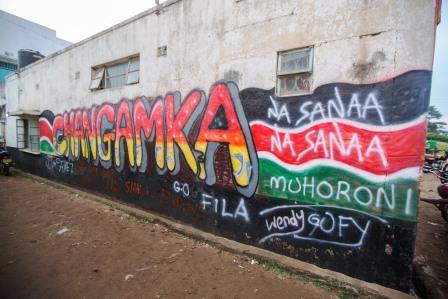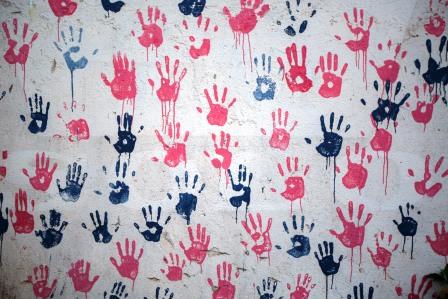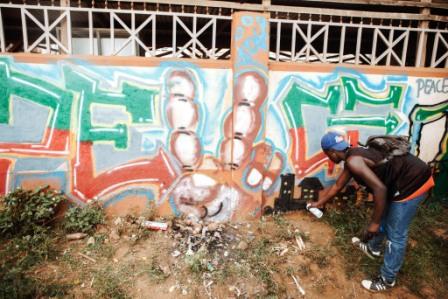Share this
Kondele, Obunga, Nyalenda, Bandani and Muhoroni have been identified as some of the most volatile areas during political conflicts in Kisumu. Other than Muhoroni which is a border town, the other four are informal settlements within Kisumu Central Constituency, esentially the city.
During the 2007/2008 Post-election Violence (PEV), tens of lives were lost in Nyalenda, Obunga, Bandani and Kondele as rioters engaged with the police. Although the conflict during PEV was largely political, the criminal elements in these informal settlements took advantage of the overstretched security agencies to loot properties from residents perceived to be from non-indigenous communities or to be rich.
Ibrahim Yusuf Bilhali (Yusuf) is a budding comedian and musician from Kondele. His peers called him Bad Manners, a name he later adopted for himself as a stage name. That name though gives you just a glimpse of what his past was like.
Yusuf grew up living with his aunt.By the time he was 12 years old his guardian could not tell him anything.
I was a rebel. I knew they were not my parents and I disregarded their advice, I did as I was pleased.
Kondele was known as the home to some of Kisumu’s toughest criminal gangs. Some very organized and some very amorphous. By the time Yusuf was 14 years old, he had already quit school and was deeply entrenched in the gangs. During the PEV period mentioned earlier, Yusuf was part of the gangs that looted businesses around Kondele, Manyatta and Arina estates in Kisumu.
We were organized at several levels. There were those who went breaking into shops and houses. Our job was to ferry the stolen items into already identified areas for safe keeping. Then there were those who would sell the stolen items.
It was not an easy life he says. He lived fearing that one day a bullet might catch him as it did some of his colleagues in the gangs. The rebellious spirit in him would however block him from going back home. He survived the period but when a political truce was reached between the government and opposition, he needed a new source of livelihood because the peace that was slowly returning was not conducive for looting. His new friends taught him how to pick pockets. Kisumu night clubs would be ideal setups for his new trade.
One of the clubs I went to had a session for rap battles. I was impressed by how these young artists moved the crowd and I wanted to do just that. I took time to perfect my skills and soon I would visit the clubs not only to pick pockets but also to perform. It was a nice feeling. As much as I would not be paid for the performance, I always went home with a couple of stolen phones which I would later sell.
Yusuf made friends who were doing music while at the club. They introduced him to a producer who would have taken his career to the next level. He had however made a name for himself as a petty thief of the streets and everyone he tried getting close to kept him at arms length. He saw his peers finish school and get into lucrative careers while he was staying in the streets living one day at a time. Some of the young rappers he battled with at the club were now living off their art. It’s at that point that he decided that crime wasn’t really going to pay him.

I met Yusuf for the first time this week while I was attending a youth program dubbed Changamka Na Sanaa organized by Pawa Initiative. The organization was founded by Kenyan photojournalist turned activist, Boniface Mwangi. It brings together young social conscious artists and activists who believe in the dream of “a better Kenya.”
In Kisumu, they are using art to educate youths on the importance of democracy, participating in electoral processes and maintaining peace during electioneering period. In most Kenyan towns youths like Yusuf have been used by politicians or criminals to create chaos before, during or after elections for their own selfish gains.
Graffiti, spoken word, comedy, music and dance are some of the methods employed by Changamaka Na sanaa in teaching the youths and women about the important role they play in a democracy such as ours, especially as we head to elections in about 50 days.
Cliff Aboki The Poet is another artist I met at one of the events in Nyalenda. He unlike Yusuf has no background in crime but is very passionate about ensuring that young people and women actively participate in democratic processes.
Look at us, nobody takes us seriously unless they want to use our energies in throwing stones. We have to take charge and change this situation. It’s only possible through meaningful engagements. That is why I use my talents in speaking to the youths and women.
Yusuf and Cliff have are part of this program that aims to reach more than 50,000 youths and women directly. Here they are mentors in spreading the message on the importance of keeping and participating in electoral processes. Others like Yusuf know this from personal experiences and are now at the fore front of ensuring other young Kenyans do not go down that road.
Art is definitely an exciting way to do that – even if it’s through techniques such as graffiti that are not really common in Kisumu. Lynnette Micheni, the Executive Director at Pawa Initiative underscores the effectiveness of reaching this critical mass through art.
Art is a powerful tool that transforms lives and leaves lasting impressions on everyone who engages with them. We hope to leave a mark on Kenyan voters especially women and young people as they undertake their civic duty to vote on August 8th, 2017.

Other than Kisumu, youths in Nairobi, Nakuru and Mombasa will also benefit from similar initiatives. The projects involve a pledge wall to maintain peace and graffiti, community forums at various locations in the participating cities and an art boot-camp where establish artists who are part of the Pawa Initiative pass down their kills to local artists participating in the project.
Follow me on Twitter and IG @IamOminde
Follow this blog on Twitter @OmindesWords





